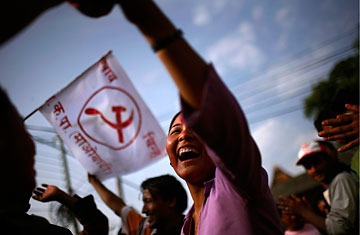
Nepali Maoist supporters at a victory celebration outside of a vote counting center April 12 in Kathmandu
Not so long ago, few in Nepal believed Pushpa Kamal Dahal actually existed. The Maoist guerrilla leader was a creature of myth — no one knew what he looked like, or in which mountain fastness he hid, or quite how he and his fighters, ragtag and ill-equipped, had managed to plunge this Himalayan nation into a decade-long civil war that claimed 13,000 lives. But now all know Prachanda, the nom de guerre by which Dahal is more often referred to, as not only a man of flesh and blood, but of suits and expensive pens. Indeed, as results filter in from last week's historic election, the once incendiary, class warfare-waging rebel may be on the verge of becoming Nepal's first ever President.
In an election contested by more than 50 parties, Prachanda's Communist Party of Nepal-Maoist has already claimed some 116 seats of the new 601-member Constituent Assembly in directly-elected district polls. That number will potentially mushroom once the remaining majority of the Assembly's seats are allocated on a proportional ballot over the next two weeks. Observers expect the Maoists to hold the largest number of seats of any party, albeit not a clear majority, in a body that is tasked to draft the first constitution of the Nepalese republic. It's a stunning turnaround from the days when Prachanda and his comrades stalked the jungles in fatigues, most armed with little more than sticks and stones.
Prachanda's rise is testament to the unprecedented political transformation gripping Nepal. Two years ago, Maoist-backed mass protests stripped the 240-year-old monarchy, once thought divine, of much of its power and led to a peace accord between the Maoists and Nepal's political establishment. The monarchy will be formally abolished once the Constituent Assembly meets. Its royal legacy — that of a highly feudal society where power radiated out of the palaces of Kathmandu — will be slowly dismantled as Nepal's politicians reshape the country into a modern, federal republic where previously disenfranchised groups like low-caste Dalits, indigenous minorities, and women will have more say.
"It is a mandate for radical change," says Lokraj Baral, a leading political analyst, speaking of the Maoists' dramatic gains. But the question remains how delicately Prachanda and his cadres — still on the U.S. State Department's list of terrorist groups — will wield their newfound power. In the Constituent Assembly, they will have to cope with influential and likely hostile parties like the establishment Nepali Congress as well as a coterie of other anti-Maoist groups. Despite repeated assurances from Prachanda of the Maoists' commitment to consensus-building and multi-party democracy, doubts linger. Maoist youth were involved in a series of violent clashes that marred the run-up to the election and left at least 40 dead. Election monitors are investigating suspected polling irregularities in some districts the Maoists have won, but these cases aren't expected to dramatically alter the election's outcome.
Already, the international community is bracing itself for a Maoist victory, especially Nepal's giant neighbor to the south. Indian Foreign Minister Pranab Mukherjee said Monday that his government viewed Maoist electoral successes "as a positive development." India, faced with its own vast Maoist insurgency in over a hundred districts, had staunchly defended the monarchy throughout the bloody civil war. Now Indian politicians are pointing to the Nepal example as an encouraging sign of left-wing extremists finding faith in the ballot box.
The two nations share a common cultural patrimony and, more significantly, a porous, open border. Indian business interests have long run the Nepalese economy, which is now slumping along at a 2% growth rate, crippled by war, years of capital flight and the migration of its best workers abroad. Any government would have to reverse this trend, but some fear Maoist ideological grandstanding — India is still often referred to as the "expansionist" enemy — will get in the way. The Maoists, seated in their plush offices in Kathmandu, simply brush such criticisms aside. "We are not stupid people," says C.P. Gajurel, their foreign policy chief, in an interview with TIME earlier this year. "We will not do stupid things."
As the Maoists cement their place in the halls of power, there is much these former guerrillas will have to prove, from crafting a national consensus around foreign policy to creating new jobs at home. Prachanda has gone on record hailing the Chinese Communist Party's pragmatic model of capitalism — ironic considering how China, just like India, shunned him and his revolution and supplied the Royal Nepalese Army with arms throughout the civil war.
Now, though cautious not to tread too heavily on a country very much within India's sphere of influence, China is beefing up its interests in this strategic Himalayan region bordering restive Tibet. Chinese companies are aggressively pursuing lucrative deals to tap Nepal's glacial rivers for hydropower, while state officials are cozying up to the Maoists in Kathmandu. When I was in Nepal at the end of last year, I met a Maoist commander who had traveled with a delegation to visit the village home of their namesake in China's Hunan province. He gushed in praise of Mao, but his eyes twinkled most when recounting his time spent amid the skyscrapers and shopping arcades of Shanghai. "That was something else," he gasped. When I asked him whether he could imagine such a city in Nepal, he simply laughed and looked away. Nepal has too many other questions that need answering for this one to be even considered. With reporting by Yubaraj Ghimire/Kathmandu
